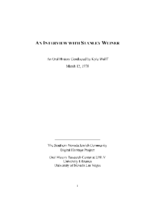Search the Special Collections and Archives Portal
Search Results

Transcript of interview with Miriam "Mimi" Katz by Barbara Tabach, December 10, 2014
Date
Archival Collection
Description
In this interview, Mimi Katz discusses growing up in the Boston area and her schooling, and moving to Washington, D.C. working as a physiotherapist. She returned to Boston and met her husband, and she talks about moving to Las Vegas and adjusting to life here. They became involved at Temple Beth Sholom, and Mimi worked as a conventions coordinator at the Sands and the Sahara. She discusses moving around in Las Vegas from an apartment to a house in the John S. Park neighborhood, working for the Jewish Federation, and helping to develop the Holocaust education program with Edythe Katz, conducting oral history interviews with survivors. She continued working at the Convention Center in the 1980s, and is involved in the Lou Ruvo Center.
Everyone knows her as Mimi. She was born Miriam Green to immigrant parents in Boston, Massachusetts, in 1926. As a youngster she danced, excelled at school and enjoyed an abundance of sports. To pay for her higher education at Massachusetts School of Physiotherapy she worked at Raytheon Manufacturing. In 1957 she married George Katz who swept her away to their honeymoon in Las Vegas. It's a story that she loves to recall-they never left. She sent for her things and energetically settled in to her new hometown and marriage. Mimi found employment with the Clark County School District, began having children (three daughters), and making fast new friends. Many of these friends were from the founding days of Temple Beth Sholom, which roots her to the history of the local Jewish community. In addition, for a decade she worked in community relations for the Jewish Federation. She valued community activism and volunteered over the years for many organizations; such as Easter Seals, Jewish War Veterans, Parent Teachers Association and the Lou Ruvo Center for Brain Health, and many more organizations over the subsequent decades.
Text

Transcript of interview with Michael S. Mack by Claytee White, May 21, 2009
Date
Archival Collection
Description
During this interview, Michael Mack visualizes his childhood memories of the later 1930s, when Las Vegas was a small, but steadily growing, desert town. As he says, "The desert was our backyard." The Strip hotels like the last Frontier and the Flamingo pop into the stories, but it was basically an innocent time. He attended John S. Park Elementary when classrooms were temporary buildings from the local Air Force base and the neighborhood was filled with children. He still maintains close friendships from that time. And he also recalls friends from the Westside neighborhood. Michael talks of scouting, riding horses, and watching Helldorado parades.
Michael Mack's first recollection of Las Vegas is as a two-year-old living in a duplex on Bonneville Ave. Though the family moved several times, they remained in or near the John S. Park neighborhood. Michael's father was a Polish immigrant who arrived in Boulder City, where he opened a shoe store, in 1932. The building of the Hoover Dam brought opportunities and his father Louis expanded into the salvage business. In time Louis moved the family to Las Vegas, opened a retail clothing store, which eventually sold uniforms, and set up the first local bail bondman office. During this interview, Michael visualizes his childhood memories of the later 1930s, when Las Vegas was a small, but steadily growing, desert town. As he says, "The desert was our backyard." The Strip hotels like the last Frontier and the Flamingo pop into the stories, but it was basically an innocent time. He attended John S. Park Elementary when classrooms were temporary buildings from the local Air Force base and the neighborhood was filled with children. He still maintains close friendships from that time. And he also recalls friends from the Westside neighborhood. Michael talks of scouting, riding horses, and watching Helldorado parades. Though the Macks were a Jewish family, Michael's mother always brought the Christmas tree to school. It was a period when people memorized each other's 3-digit phone numbers, went to movies for 14 cents, and there was a ranch for people to stay while getting divorced. Halloween Trick-or-treaters in the John S. Park neighborhood might get a tasty cupcake or a shiny dime. Michael has a plethora of stories about innocent mischief and the unique experiences of a boy growing up in Las Vegas.
Text

Transcript of interview with Stanley Weiner by Kyle Wolff, March 12, 1978
Date
Archival Collection
Description
Interview with Stanley Weiner by Kyle Wolff on March 12, 1978. In this interview, Weiner begins by talking about his father's employment, and then his own series of jobs, including as a department manager at Sears. He discusses living in different parts of town, population growth, educational opportunities, transportation, and recreation. The interviewer asks specific questions about sports, hotels, unions, and the weather.
Text

Transcript of interview with Ron Lurie by Barbara Tabach, June 5, 2015
Date
Archival Collection
Description
Interview with Ron Lurie by Barbara Tabach on June 5, 2015. In this interview, Lurie discusses his family and his time in politics, campaigning for office, and some of his accomplishments while in office as mayor and in the city council. He also talks about growing up in Las Vegas and attending Las Vegas High School, and working for his father, Art Lurie, in the grocery store business.
Ron Lurie was a rambunctious teenager when the Lurie family moved to Las Vegas from California. He adapted quickly to Las Vegas and made fast friends. He is a 1958 graduate of Las Vegas High School. His father, Art Lurie, a supermarket businessman, was also a well-known professional boxing judge and a former Nevada Athletic Commission chair. In 1987 Ron became the first person of Jewish ancestry to be elected Mayor of Las Vegas. Previously, he was fourteen year member of the Las Vegas City Council and served on many community boards and commissions. Since political office was not a fulltime position, Ron's career path developed in a couple of different ways. He tells the story of becoming a butcher and the opportunities he experienced becoming a successful salesman of gaming machines for Si Redd, IGT and others. His over three decade gaming career continues as of this oral history. He is executive vice president and general manager of Arizona Charlie's Decatur location. In this oral history he reflects on some of his political accomplishments as mayor and city councilman. He also served six years on the State of Nevada Wildlife Commission and is a member of the Fraternity of the Desert Bighorn.
Text

Transcript of roundtable interview with the Holocaust Resource Center: Myra Berkovits, Susan Dubin and Doug Unger, by Barbara Tabach, September 4, 2014
Date
Archival Collection
Description
Interview with Myra Berkovits, Susan Dubin and Doug Unger of the Holocaust Resource Center. In this interview, the group discusses the beginnings of what is now the Sperling Kronberg Mack Holocaust Resource Center. Edythe Katz-Yarchever is discussed as the catalyst for establishing the center and getting others involved with the Governor's Advisory Council on Education Relating to the Holocaust. Berkovits talks about her role as a liason for Holocaust education in the Clark County School District and the student-teacher conferences held each year with funding from Sheldon Adelson. Unger discusses expanding the outreach to the Washoe County School District with assistance from Atlantis Hotel (Reno, Nev.) owner, John Farahi and Judy Mack. They talk about the previous locations of the Holocaust Resource Center on Maryland Parkway, then Renaissance Drive, and the affiliation with the Jewish Federation and the Jewish Family Service Agency. After funding and personnel issues around 2011, the advisory council and the library went through a re-structuring and hired Susan Dubin who organized and catalogued the library collection. The library is now accredited by the Association of Jewish Libraries.
Text

Transcript of interview with Richard "Curley" Francis by Connie Degernes, March 4, 1975
Date
Archival Collection
Description
On March 4, 1975, collector Connie Degernes interviewed truck driver and rigger, Richard L. (Curley) Francis (born on July 27, 1907 in Compton, California) in his home in Boulder City, Nevada. The main focus of this interview is the construction of the Hoover Dam. Mr. Francis discusses the various occupations he has held since relocating to Nevada, including, Cat Skinner, truck driver, cableway operator, rigger foreman, and crane operator. He also talks about working for the government and the Six Company in Las Vegas.
Text

Transcript of interview with Tony Grasso by Coleen Seifert, February 29 & March 1, 1980
Date
Archival Collection
Description
On February 29, 1980, Coleen Seifert interviewed Tony Grasso (born 1926 in Brooklyn, New York) about his career in gaming. Grasso first provides details on his background and how he ended up moving to Las Vegas in 1951 before talking about his experience as a dealer in some of the early casinos. He also talks a little about the different roles and games that casino workers deal and how players are invited to visit casinos. The interview concludes with a discussion on gaming unions and Grasso’s future plans. On a date that soon followed the above date, Seifert also interviewed Doug Charles (born 1954 in Brooklyn, New York) about his career in the gaming industry. Charles also talks about his family background, his arrival to Las Vegas in 1957, and the early development of the various gaming properties in Las Vegas. He later goes into detail over some of his experiences as a dealer, his opinions on mob control over gaming, and some of the political and legal issues that have arisen in La
Text

Transcript of interview with John Graves by Hank Baran, March 1, 1987
Date
Archival Collection
Description
On March 1, 1987, Hank Baran interviewed John Graves (born February 21st, 1938 in San Diego, California). This interview covers the gaming industry overall, and also highlights, women in gaming, more specifically. Mr. Graves also discusses the hotels on the Las Vegas Strip, McCarran Airfield, and golfing in Southern Nevada.
Text

Transcript of interview with Colleen Gregory by Tim Waters, April 6 & 7, 1976
Date
Archival Collection
Description
On April 6 and 7, 1976, Tim Waters interviewed Colleen Gregory (born 1928 in Santa Clara, Utah) about her life in Southern Nevada. Gregory first talks about her original move to Las Vegas, her early education, school activities, and her college education. She also talks about the first banks, Helldorado, the atomic testing, and environmental changes. Other topics covered include Howard Hughes, Western-style influences, first properties on the Strip, World War II, racial prejudice, and changes she has noticed during her career in banking.
Text

Transcript of interview with Ethel S. Hatch by P. Kohlman, November 24, 1975
Date
Archival Collection
Description
On November 24, 1975, collector P. Kohlman interviewed housewife, Ethel S. Hatch (born April 11th, 1914 in Valentine, Texas) in her home in Las Vegas, Nevada. This interview covers the history of Las Vegas from 1939 to 1975. Mrs. Hatch also talks about ranching in Nevada, Rex Bell, development on the Strip, the first hotels, and early local shopping culture. She refers to Block Sixteen as Block Thirteen when discussing the Red Light District. The interview concludes with discussion surrounding tree-lined streets, the Helldorado Club, and Fremont Street.
Text
